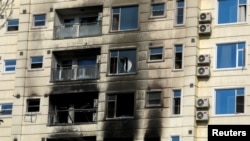United Nations counterterrorism officials warned during a Security Council meeting Monday that an Islamic State affiliate in Afghanistan remains a significant threat to regional and global security.
The discussion centered on the threat posed by Islamic State, also known as Daesh, and its regional offshoots to international peace and security.
The Afghan-based Islamic State-Khorasan (IS-K) was highlighted as one of the “most dangerous branches” of the transnational terrorist group. It has carried out repeated high-profile attacks targeting Afghan civilians and members of the country’s de facto Taliban rulers.
“ISIL-Khorasan has continued to pose a significant threat in Afghanistan, the region and beyond,” Vladimir Voronkov, U.N. undersecretary-general for counterterrorism, told the meeting, using another acronym for IS-K.
He stated that IS-K supporters had plotted attacks in Europe and were actively seeking to recruit individuals from Central Asian countries.
“There were also reports of small numbers of foreign terrorist fighters continuing to travel to Afghanistan,” Voronkov said. He renewed a U.N. appeal for all member states to come together to prevent the South Asian country from “again becoming a hotbed of terrorist activities.”
While addressing the meeting, U.S. Ambassador Dorothy Shea described IS-K as a significant global threat.
“We remain concerned about ISIS-K's capabilities to plot and conduct attacks, as well as sustain recruitment campaigns, particularly in Afghanistan and Pakistan,” Shea stated, using another acronym for IS-K.
Chinese envoy Fu Cong cautioned without elaborating that terrorists linked to IS-K, al-Qaida and the anti-China East Turkestan Islamic Movement “are very active” in Afghanistan and “are colluding with each other.”
“China calls on the Afghan interim government to take visible and verifiable action to disintegrate and eliminate all terrorist organizations entrenched in Afghanistan,” Fu said, referring to the Taliban government, which is not recognized by any country.
Vassily Nebenzia, Russia's ambassador to the U.N., attributed the increasing threat of IS-K to the hasty withdrawal of U.S.-led NATO troops from Afghanistan in 2021.
“The growing activity of ISIL-Khorasan is no coincidence. While hastily leaving Afghanistan, NATO troops abandoned vast quantities of weapons and equipment there, which then fell into the hands of ISIL inter alia [among other things],” Nebenzya asserted.
Munir Akram, Pakistan’s envoy to the U.N., questioned the validity of U.S. claims that IS-K is conducting recruitment campaigns in his country. He cited U.N. findings that Afghanistan is “the main hub for ISIL-K’s recruitment and facilitation” and rejected “any imputation that there is any such recruitment in Pakistan.”
Taliban authorities have not responded to the U.N. assertions but have persistently downplayed IS-K activities in the country, claiming that no foreign terrorist groups operated on Afghan soil.
De facto Afghan leaders assert that Taliban counterterrorism forces have nearly eliminated IS-K hideouts, and the group can no longer pose a threat to Afghanistan or other nations from its territory.
However, IS-K has routinely conducted and claimed attacks targeting members of the Afghan Shiite community and the Taliban.
Last December, an IS-K suicide bomber targeted and killed Khalil Ur-Rahman Haqqani, the Taliban’s minister of refugees, along with several of his associates inside his ministry in Kabul, the Afghan capital. This marked the most high-profile assassination since the Taliban regained control of Afghanistan in August 2021, following the withdrawal of NATO troops from the country.




